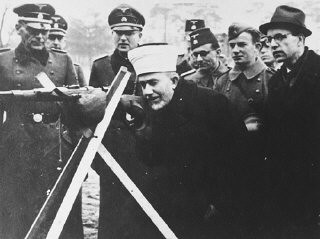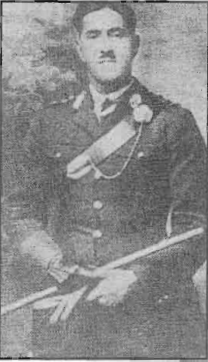
en.m.wikipedia.org
[ Arabs can be Nazi sympathizers and Nazis themselves ]
During the war, the Nazi regime found many willing
collaboratorsthroughout the world who sought to advance their own political goals and extend Axis influence. A host of exiled political leaders—such as Indian nationalist Subhas Chandra Bose, Syrian guerilla rebel Fawzi al-Qawuqji, former Iraqi prime minister Rashid 'Ali al-Kailani, and former Mufti of Jerusalem Hajj Amin al-Husayni (Arab nationalist and prominent Muslim religious leader)—escaped to
Berlin, where they broadcast appeals to their home countries in order to foment unrest, sabotage, and insurrection against the Allies. In exile in Europe from 1941 to 1945, al-Husayni's status was that of a prominent individual anti-Jewish Arab and Muslim leader.
Without any institutional basis for authority over Arabs anywhere in the Middle East, al-Husayni sought public recognition from the
Axis powers of his status as leader of a proposed Arab nation. He also sought public approval from the Axis powers for an independent Arab state or federation to "remove" or "eliminate" the proposed Jewish homeland in Palestine. He made this declaration a condition for the awaited general uprising in the Arab world. The Germans, and Hitler in particular, repeatedly denied al-Husayni's request for legitimization. They were reluctant to initiate unnecessary disputes with Italy or Vichy France, harbored doubts about the extent of al-Husayni's actual authority in the Arab world, and had reservations about making long-term statements regarding areas of the world beyond the reach of German arms. When he received al-Husayni on November 28, 1941, a meeting covered in the German press, Hitler was sympathetic, but declined to give al-Husayni the public declaration of support that he sought. Despite Hitler's response, al-Husayni still collaborated with Nazi Germany and Fascist Italy in several ways. He broadcast anti-Allied and anti-Jewish propaganda by radio to the Arab world and to Muslim communities under German control or influence. He sought to inspire and to indoctrinate Muslim men to serve in Axis military and auxiliary units. Even after he realized that the Germans would not give him what he sought and intended to use his Muslim recruits without regard to his advice, al-Husayni continued to work with both Fascist Italy and Nazi Germany until 1945. The Germans provided shelter and funds to al-Husayni and used him wherever it seemed productive, but they refused to make any commitments about the future of the Arab world, or about his position in that world. The Germans set up al-Husayni comfortably, even lavishly. He used a villa in Berlin-Zehlendorf for his office and residence and received a generous monthly stipend for expenses related to these quarters, his politics, and his entertainment.
(full article online)
Former Mufti of Jerusalem Hajj Amin al-Husayni was an exiled political leader who sought an alliance with the Axis Powers. Learn about his wartime propaganda efforts.

encyclopedia.ushmm.org










